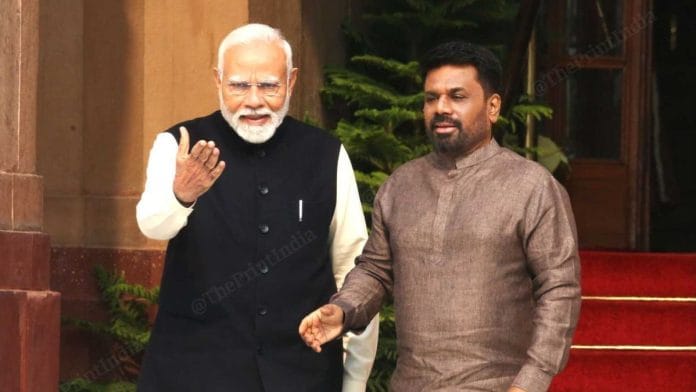Bangkok: A reset in defence ties, debt-restructuring, grant assistance and energy connectivity are all the key expected outcomes of Prime Minister Narendra Modi’s three-day visit to Sri Lanka, which starts Friday evening.
The visit, which will be the longest by Modi to the island country, will be his fourth trip to Sri Lanka, and his first since 2019. One of the main aspects of the visit is the reset of sorts in the India-Sri Lanka military ties, with a defence pact expected to be signed by the two governments.
It will be the first such agreement, following India’s intervention in the Sri Lankan civil war in the late 1980s through the Indian Peace Keeping Force (IPKF) mission, which operated in the island country between 1987 and 1990.
“We are working on a new agreement on defence cooperation with Sri Lanka and we very much hope that that can be concluded during this particular visit, it is to be signed for the first time,” said Vikram Misri, the Indian foreign secretary, last Friday during a press briefing in New Delhi.
Another expected outcome from the visit are the measures India will be taking to support Sri Lanka’s economic recovery. India extended close to $4 billion in assistance between 2022 and 2023, as Colombo declared bankruptcy during the aftershocks of the COVID-19 pandemic. Misri highlighted that a memorandum of understanding in multi-sectoral grant assistance will be exchanged between the two governments during the prime minister’s visit.
Modi will travel to Colombo following his visit to Bangkok for the sixth BIMSTEC leaders’ summit and a bilateral meeting with the Thai leadership. He will travel to Anuradhapura, where he will pay respects at the Jaya Sri Maha Bodhi Temple, along with Sri Lankan President Anura Kumara Dissanayake, before returning to India, with a stop at Ramanathapuram.
Modi will be the first foreign leader to be hosted by Dissanayake, following his victory in the Sri Lankan Presidential election in September 2024. The visit comes four months after Dissanayake visited India for his first official overseas visit. The back-to-back visits come as India looks to continue building its ties in Sri Lanka, after China’s increasing footprint in recent years.
For Colombo, the visit is a signal to Indian businesses that it is still open for business and investment in Sri Lanka, despite the Adani Group pulling out of a renewable energy deal in the country in February 2025, a person familiar with the matter said.
Also Read: India-Thailand reset ties amid Trump’s tariffs, elevate relations to ‘strategic partnership’
Economic & energy ties
Since Sri Lanka’s economic challenges, India has not only stepped in to extend emergency funding, but also played a key role in providing assurances, which led to the International Monetary Fund (IMF) extending an economic support programme for Colombo. New Delhi also co-chaired the Official Creditors Committee to restructure Sri Lanka’s debt. An agreement on the same is expected from the visit.
“We also played a very important role as co-chair of the Official Creditors Committee and have been working together now with Sri Lanka also in finalising the debt restructuring agreements. Some agreements have already been signed, but we are in the final stages of concluding some other agreements. They are likely to be concluded very soon. You will hear about them during the course of the visit,” said Misri last week.
Another key sector of focus will be energy and energy connectivity. The two leaders will witness the virtual groundbreaking of the Sampur Solar Energy project, aimed at boosting the energy partnership between the two countries. A 120-megawatt solar power plant will be built in Trincomalee district.
Modi is also expected to raise the issue of the welfare of Indian fishermen arrested by Sri Lankan authorities for allegedly crossing the international maritime boundary and fishing in Colombo’s waters.
Misri highlighted that at every meeting, the issue has been “forcefully” raised by the Indian side, and will figure in the talks with Dissanayake. The Sri Lankan Navy in 2025 has arrested at least 140 Indian fishermen. In 2024, over 550 Indian fishermen were arrested by Sri Lankan authorities.
(Edited by Mannat Chugh)
Also Read: ‘Every region must look out for itself,’ says Jaishankar at BIMSTEC, as Trump unveils global tariffs






